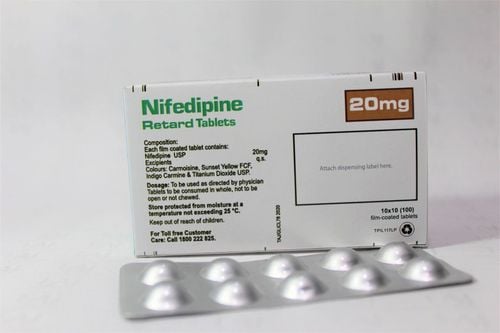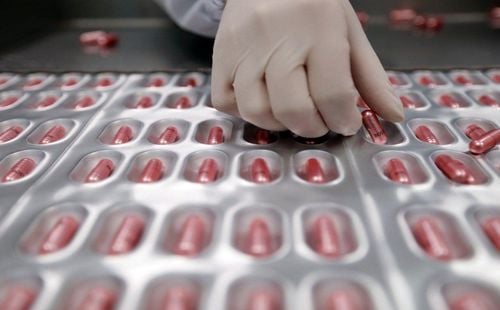This is an automatically translated article.
Herbesser is made in the form of tablets, the main ingredient is diltiazem hydrochloride. The drug is used to treat angina pectoris, essential hypertension, ...
1. Uses of Herbesser
Herbesser drug is prepared in the form of Herbesser 30 and Herbesser 60. Indexes 30 and 60 indicate the content of diltiazem in the drug (30mg and 60mg). So what is Herbesser 30mg, what is Herbesser?
Herbesser helps to improve myocardial ischemia and reduce blood pressure (thanks to its ability to dilate vessels by inhibiting the influx of calcium ions and smooth muscle cells of coronary and peripheral blood vessels). .
The article will focus on the dosage form Herbesser 60 . This drug is indicated in the following cases:
Angina and variants of angina; Idiopathic high blood pressure is mild to moderate. Herbesser 60 is contraindicated in some cases such as:
People with severe congestive heart disease (the drug can worsen heart disease symptoms); People with atrioventricular block - 2nd and 3rd degree ventricles or people with weak sinus syndrome; People with a history of hypersensitivity to the components of the drug; Women who are pregnant or may become pregnant.
2. Usage and dosage of Herbesser 60
2.1. Herbesser is used orally. Patients need to remove the drug from the packaging before taking it, do not chew the tablet (because chewing reduces the slow-release nature of the drug).
2.2. Dosage Angina, variant of angina: The usual dose is 30mg/time x 3 times/day (equivalent to 90mg/day). The dose can be increased to 60mg/time x 3 times/day (equivalent to 180mg/day) if necessary; Mild to moderate essential hypertension: The usual dose for adults is 30-60mg/time x 3 times/day (equivalent to 90-180mg/day). Dosage can be adjusted depending on the age and symptoms of the patient. Herbesser dosage is for reference only. The specific dose will be prescribed by the doctor depending on the condition, the progress of the disease.
2.3. Overdose When overdosing, patients have symptoms of bradycardia, heart disease, hypotension, complete atrioventricular block,... At this point, it is necessary to stop taking Herbesser 60 immediately, use measures. appropriate treatment. When necessary, the drug can be withdrawn, gastric lavage.
2.4. Missed dose When forgetting to take a dose of Herbesser, the patient should take the medicine as soon as possible. If it is almost time for your next dose, skip the missed dose and take your next dose at the scheduled time.
3. Side effects of the drug Herbesser 60
When using Herbesser 60, patients may experience some side effects such as:
Adverse reactions of clinical significance (rarely less than 0.1%): Complete atrioventricular block, heart rhythm severe bradycardia, congestive heart failure, mucosa-skin-eye syndrome, toxic epidermal necrolysis, erythema, liver dysfunction, jaundice with increased AST, SALT, e-GTP,... Other adverse effects: Sinus - atrial block, bradycardia, flushing, dizziness, atrioventricular block, sinus arrest, hypotension, chest pain, palpitations, edema, increased liver enzymes, hepatomegaly, development rash, muscle cramps, weakness, insomnia, somnolence, Parkinson's-like symptoms, headache, muscle cramps, itchy skin, urticaria, abdominal pain, constipation, stomach upset, loss of appetite, heartburn, nausea , soft stools, diarrhea, thirst, leukopenia, thrombocytopenia, gingival hyperplasia, frostbite, gynecomastia in men,...
4. Be careful when using Herbesser
When using Herbesser 60, caution should be exercised in the following subjects:
People with congestive heart failure (which may worsen heart disease symptoms); People with too slow heart rate (less than 50 beats/min) or first-degree atrioventricular block (which can cause excessive inhibition of sinus rhythm and cardiac conduction); People with severe hypotension (may further lower blood pressure); People with serious disorders of liver - kidney function (reduced metabolism, reduced elimination may increase the effect of the drug) In addition, when using Herbesser 60, you should note some of the following issues:
Stopping Herbesser suddenly can make your symptoms worse. Therefore, when stopping the drug, it is necessary to reduce the dose gradually, carefully monitoring the patient. Patients must not arbitrarily stop taking the drug without the doctor's permission; The drug has an effect on lowering blood pressure, so it can cause dizziness. Patients need to be cautious when participating in activities with great risks, requiring alertness such as working at height, driving, operating machinery; Caution when combining drugs with drugs that are likely to interact with Herbesser 60; The use of Herbesser 60 is contraindicated in women who are pregnant or may become pregnant (according to animal studies, this drug may cause teratogenicity); Lactation: Herbesser should not be used during lactation. If the drug is deemed necessary for the mother, breastfeeding should be discontinued for the duration of the drug (diltiazem hydrochloride may be excreted in breast milk).
5. Herbesser 60 . drug interactions
Herbesser can interact with some of the following drugs:
Antihypertensive drugs (nitrates, antihypertensives): May increase the hypotensive effect; Beta-blockers (bisoprolol fumarate, atenolol, propranolol hydrochloride,...): May experience symptoms of atrioventricular block - atrioventricular block, sinus - atrial block, bradycardia; Preparations of Rauwolfia (reserpin); Digitalis preparations (digoxin, methyldigoxin): May experience symptoms of bradycardia, atrioventricular block,... Symptoms of digitalis toxicity (headache, nausea, vomiting, abnormal vision, shock) dizziness,...) including arrhythmias due to increased levels of digitalis preparations in the blood; Antiarrhythmic drugs (mexiletin hydrochloride, amiodarone hydrochloride): Possible symptoms of bradycardia, sinus arrest, atrioventricular block; Aprindin hydrochloride (antiarrhythmic drug): May experience symptoms due to increased levels of 2 drugs in the blood such as bradycardia, sinus arrest, tremor, atrioventricular block, delirium, dizziness,...; Dihydropyridine calcium antagonists (amlodipine besilate, nifedipine...): May experience symptoms such as increased blood pressure lowering effect because of increased concentration of dihydropyridine calcium antagonists; Triazolam (hypnotic): May experience symptoms such as prolonged sleep due to increased blood levels of triazolam; Midazolam (sedative sedative): May experience symptoms such as increased sedative effect, causing sleep due to increased midazolam blood concentration; Carbamazepine (psychotropic, manic treatment, antiepileptic): Patients may experience symptoms of drowsiness, nausea, vomiting, dizziness, ... due to increased blood levels of carbamazepine; Selegiline hydrochloride (anti-Parkinson): May increase the effects and toxicity of selegiline hydrochloride; Theophylline (bronchodilator): Patients may experience symptoms of nausea, vomiting, insomnia, headache, ... due to increased theophylline levels in the blood; Cilostazol (antiplatelet agent): The effect of cilostazol may be increased; Vinorelbine tartrate (anti-melanoma): The effects of vinorelbine tartrate may be increased; Cyclosporin (immunosuppressive drug): Patients may experience symptoms of kidney dysfunction due to increased blood levels of cyclosporin; Tacrolimus hydrate (immunosuppressive drug): Patients may experience symptoms of renal dysfunction due to increased blood levels of tacrolimus; Phenytoin (antiepileptic): Patients may experience symptoms of dizziness, ataxia, nystagmus, ... due to increased levels of phenytoin in the blood; Cimetidine (H2 receptor antagonist): Patients may experience symptoms of bradycardia, increased blood pressure lowering effect due to increased concentration of diltiazem hydrochloride in the blood; HIV protease inhibitors (saquinavir mesylate, ritonavir,...); Rifampicin (anti-tuberculosis): The effect of diltiazem hydrochloride may be reduced; Anesthesia (isofluran, enfluran, halothan,...): Possible symptoms of sinus arrest, bradycardia, atrioventricular block; Muscle relaxants (vecuronium bromide, pancuronium bromide): May increase the effect of muscle relaxants. When using Herbesser 60, patients should follow all the doctor's instructions to achieve the best treatment effect. To avoid adverse reactions due to drug interactions, patients should list the medications they are taking and tell their doctor.
Please dial HOTLINE for more information or register for an appointment HERE. Download MyVinmec app to make appointments faster and to manage your bookings easily.













